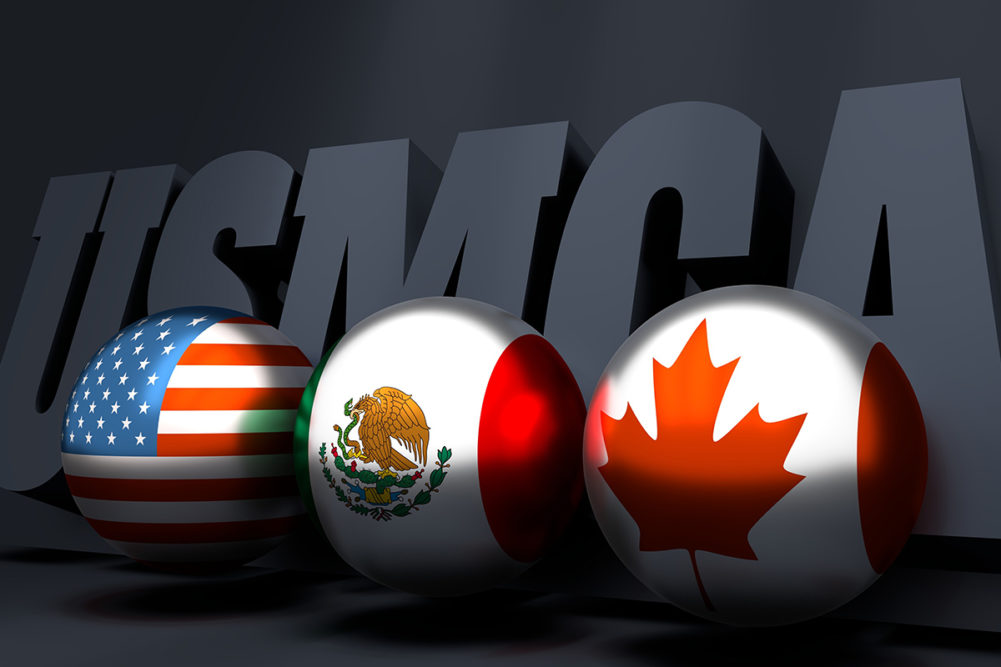WASHINGTON, D.C., U.S. — The U.S. Senate approved the U.S.-Mexico-Canada Agreement (USMCA) trade agreement with an 89 to 10 vote on Jan. 16.
The trade deal was previously approved by the U.S. House on Dec. 19, 2019 with a bipartisan vote of 385 to 41, which means it now moves to U.S. President Donald Trump’s desk for approval.
Under the USMCA, all food and agriculture products that have had zero tariffs under the North American Free Trade Agreement (NAFTA) will continue to enjoy zero tariff access to the partner nations’ markets.
“It is the first agreement that contains strong, enforceable labor and environmental standards that will help to level the playing field for American workers,” said U.S. Trade Representative Robert Lighthizer. “It is the first trade agreement that embraces the promise of the digital economy and enhances America’s competitive advantage in technology and innovation. It is the first agreement with strong, enforceable disciplines against unfair, market distorting subsidies and currency manipulation. And it is the first trade agreement that contains a ‘sunset’ provision that will give future administrations leverage to ensure that, unlike the disaster that was NAFTA, USMCA will never become outdated and out of balance. USMCA is now the new gold standard against which all future trade agreements will be judged.”
According to the U.S. Department of Agriculture (USDA), Canada and Mexico are the United States’ first and second largest export markets for food and agricultural products, totaling more than $39.7 billion in food and agricultural exports in 2018. These exports support more than 325,000 U.S. jobs.
“The passage of USMCA is great news for America’s farmers and ranchers,” said U.S. Secretary of Agriculture Sonny Perdue. “With congressional consideration now complete, our farmers and ranchers are eager to see the president sign this legislation and begin reaping the benefits of this critical agreement. I thank President Trump and Ambassador Lighthizer for successfully delivering an improved and modern trade agreement and working so hard for the people of American agriculture to get this deal across the finish line.”
The U.S. ag industry echoed support for the USMCA trade deal and look forward to better market access.
According to the American Feed Industry Association (AFIA), free trade has allowed exports of feed ingredients, feed and pet food to more than quadruple since NAFTA’s implementation, growing from roughly $669 million in 1993 to over $3.2 billion today.
“I am excited for the opportunities that will come from the implementation of USMCA,” said Constance Cullman, president and chief executive officer of the AFIA. “The USMCA not only builds on the success of NAFTA by facilitating greater market access, regulatory transparency and accountability among the three trading partners, but it also sends a message to our other trading partners that the United States is serious about enhancing trading relationships, supporting U.S. businesses and exports and setting a new standard for how trade agreements with the United States are expected to look. In addition, many AFIA members have integrated businesses — where they have operations in the United States, Mexico and Canada and the USMCA will facilitate growth across all their business units.”
The American Soybean Association (ASA) said Mexico is the second largest market for whole beans, meal and oil, and Canada is the fourth largest buyer of meal and seventh largest buyer of oil for U.S. soybean farmers, making the trade agreement important to sustaining the growth realized in those two countries under NAFTA.
“ASA has worked throughout the year to encourage legislative support for USMCA, so we appreciate Congress working with the administration, coming together for this bipartisan effort, and getting USMCA to the final step,” said Bill Gordon, president of the ASA. “In addition to securing the Mexican market as the second largest importer of U.S. soybeans, the terms agreed to by Canada will increase U.S. poultry and dairy exports, which is also a positive for our industry.”
The National Association of Wheat Growers (NAWG) and the U.S. Wheat Associates (USW) believe the new trade deal is a step toward rebuilding trust in the United States as a reliable supplier.
“Mexico continues to be our top importing country,” said Doug Goyings, chairman of USW. “Wheat farmers are relieved to see the agreement moving on to the president and I think the Mexican millers who want our wheat are relieved, too.”
The deal also includes Canada’s agreement to terminate its discriminatory wheat grading system, enabling U.S. growers to be more competitive.
“The USMCA is a tremendous positive for the United States and the entire North American region and our interdependent economies,” said Randy Gordon, president and CEO of the National Grain and Feed Association, (NGFA). “Having a sound and competitive free trade agreement with Mexico and Canada is critical to continued economic growth and job creation in the United States and the North American region. The USMCA preserves or expands upon critical market access for U.S. agricultural products in the North American market, improves the process for resolving non-technical barriers to trade and provides a 21st century blueprint for future trade agreements.”
The USMCA expands market access to U.S. agricultural products in the North American market as well as a tariff-free environment for some ag goods and address non-tariff barriers.
Even with U.S. Congress and Mexico’s approval the pact remains in limbo as the deal moves to Trump’s desk for signature and Canada has yet to approve it. It is expected to be approved when Canada’s House of Commons resumes in late January.




